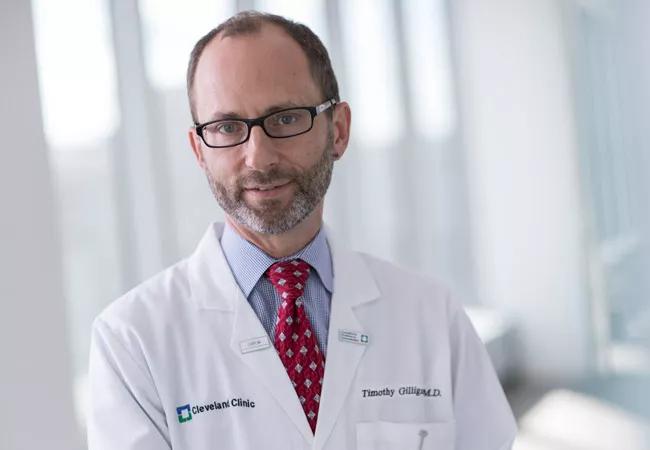An oncologist talks about the existential crisis of cancer

“For all our progress, we still die, and most of us have an awkward relationship with that reality.”
Advertisement
Cleveland Clinic is a non-profit academic medical center. Advertising on our site helps support our mission. We do not endorse non-Cleveland Clinic products or services. Policy
In an editorial recently published in the Journal of Oncology Practice, Timothy Gilligan, MD, medical oncologist and co-Director of the Cleveland Clinic Center for Excellence in Healthcare Communication, argues that oncology care is more than the discoveries and treatments that enable longer and better living for patients with cancer. “Cancer is a human drama,” he says, “an existential crisis for patients, their loved ones, and the healthcare team who cares for them and for one another.” Exciting science does not enable oncologists to understand and play an appropriate role in that drama, he argues, and end-of-life communications training is absolutely essential to oncology practice.
In sharing a loved one’s story, he writes:
“Lost in the excitement about cancer genomics, signal transduction pathways, and a focus on controlling the cancer at all costs, the life-prolonging and quality-of-life benefits of palliative medicine had been completely overlooked. I found myself heartbroken over my and others’ inability to help her to get beyond her anger at being struck down years before she had expected. She lived fiercely, and finding a way to come to terms with her fate escaped her despite all the obvious interventions. Her husband reflected that he wished they had foregone all treatment, all the hours spent driving back and forth to the hospital, sitting in the waiting room, and undergoing tests and procedures. It had been 2 years with no quality of life, he said, yet he was not sure she would have felt the same way; her life after starting treatment was miserable, but she wanted to live as long as she could. Acceptance of death was out of the question.”
Read the full story of Dr. Gilligan’s family cancer drama, his analysis of communication training for physicians, and his goals for patients at the end of their care journeys here.
Photo Credit: ©Russell Lee
Advertisement
Advertisement

First-of-its-kind research investigates the viability of standard screening to reduce the burden of late-stage cancer diagnoses

Global R&D efforts expanding first-line and relapse therapy options for patients

Study demonstrates ability to reduce patients’ reliance on phlebotomies to stabilize hematocrit levels

A case study on the value of access to novel therapies through clinical trials

Findings highlight an association between obesity and an increased incidence of moderate-severe disease

Cleveland Clinic Cancer Institute takes multi-faceted approach to increasing clinical trial access 23456

Key learnings from DESTINY trials

Overall survival in patients treated since 2008 is nearly 20% higher than in earlier patients